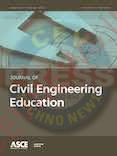Abstract
Civil engineering and construction (CEC) are among primary higher education programs preparing the next generation of subject experts and decision makers working on different aspects of infrastructure resilience, which is a key component of community resilience. However, in the curriculum of most CEC programs, there is no well-established approach for the formal education of students about resilience. Additionally, the evolving nature of the subject makes it even more challenging to develop a comprehensive knowledge foundation for CEC students regarding infrastructure and community resilience. In this situation, the perception of students becomes a critical factor shaping a program, dealing with resilience in the future. The main objective of this study is to examine the perception of CEC students toward community resilience with a primary focus on infrastructure. A quantitative research method was employed to identify challenges, potentials, importance, and gaps in students’ knowledge and quantify the comparisons. A survey was designed based on the DeVellis model and completed by 382 students enrolled in CEC programs in 15 universities across the US to assess how students perceive basic terms and factors related to resilience. Both descriptive and inferential methods were used to analyze the data. The results highlight a gap in students’ perceptions in terms of resilience definition, factors, scope, and tools, and the potential for better training programs and more engagement is warranted. The findings of this study can be utilized to design, develop, and implement modules to better educate CEC students about the subject matter. Improving the resilience knowledge level among CEC students will equip the next generation of subject experts and decision makers with proper knowledge and tools to enhance preparedness and planning, along with proactive response and recovery before, during, and after adverse natural events. This study contributes to the body of knowledge by providing an assessment on a sample group in the area of resilience within civil engineering curricula and emphasizing the necessity of embracing educational components by corresponding educators and administrators.

